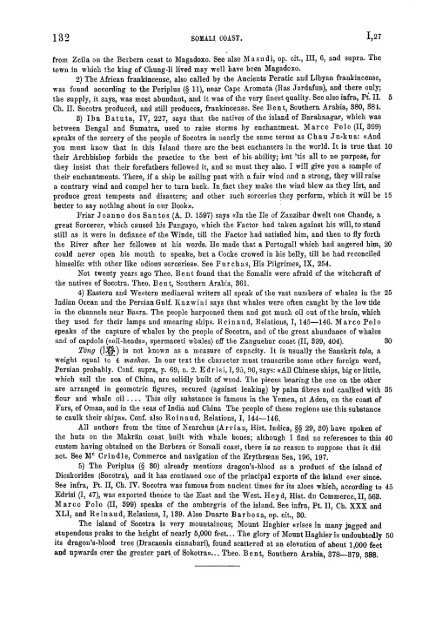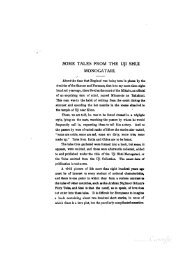Chau Ju-Kua - University of Oregon Libraries
Chau Ju-Kua - University of Oregon Libraries
Chau Ju-Kua - University of Oregon Libraries
Create successful ePaper yourself
Turn your PDF publications into a flip-book with our unique Google optimized e-Paper software.
132 SOMALI COAST. 1,27<br />
from Zeila oa the Beibera ccast to Magadoxo. See also Masudi, op. cit., Ill, 6, aad supra. The<br />
town in which the king <strong>of</strong> Chung-li lived may well have been Magadoxo.<br />
2) The African frankincense, also called by the Ancients Peratic and Libyan frankincense,<br />
was found according to the Periplus (§ 11), near Cape Aromata (Eas Jardafun), and there only;<br />
the supply, it says, was most abundant, and it was <strong>of</strong> the very finest quality. See also infra, Pt. II. 5<br />
Ch. II. Socotra produced, and still produces, frankincense. See Bent, Southern Arabia, 380, S8t.<br />
3) Ibn Batuta, IV, 227, says that the natives <strong>of</strong> the island <strong>of</strong> Barahnagar, which was<br />
between Bengal and Sumatra, used to raise storms by enchantment. Marco Polo (II, 399)<br />
speaks <strong>of</strong> the sorcery <strong>of</strong> the people <strong>of</strong> Socotra in nearly the same terms as <strong>Chau</strong> Jn-kua: «And<br />
you must know that in this Island there are the best enchanters in the world. It is true that 10<br />
their Archbishop forbids the practice to the best <strong>of</strong> his ability; but 'tis all to no purpose, for<br />
they insist that their forefathers followed it, and so must they also. I will give you a sample <strong>of</strong><br />
their enchantments. There, if a ship be sailing past with a fair wind and a strong, they will raise<br />
a contrary wind and compel her to turn back. In. fact they make the wind blow as they list, and<br />
produce great tempests and disasters; and other such sorceries they perform, which it will be IB<br />
better to say nothing about in our Book».<br />
Friar Joanno dos Santos (A. D. 1597) says «In the He <strong>of</strong> Zanzibar dwelt one Chande, a<br />
great Sorcerer, which caused his Pangayo, which the Factor had taken against his will, to stand<br />
still as it were in defiance <strong>of</strong> the Winde, till the Factor had satisfied him, and then to fly forth<br />
the River after her fellowes at his words. He made that a Portugall which had angered him, 20<br />
could never open his mouth to speake, but a Cocke crowed in his belly, till he had reconciled<br />
himselfe: with other like odious sorceries». See Purchas, His Pilgrimes, IX, 254.<br />
Not twenty years ago Theo. Bent found that the Somalis were afraid <strong>of</strong> the witchcraft <strong>of</strong><br />
the natives <strong>of</strong> Socotra. Theo. Bent, Southern Arabia, 361.<br />
4) Eastern and Western mediaeval writers all speak <strong>of</strong> the vast numbers <strong>of</strong> whales in the 25<br />
Indian Ocean and the Persian Gulf. Kazwini says that whales were <strong>of</strong>ten caught by the low tide<br />
in the channels near Basra. The people harpooned them and got much oil out <strong>of</strong> the brain, which<br />
they used for their lamps and smearing ships. Beinaud, Relations, I, 145—146. Marco Polo<br />
speaks <strong>of</strong> the capture <strong>of</strong> whales by the people <strong>of</strong> Socotra, and <strong>of</strong> the great abundance <strong>of</strong> whales<br />
and <strong>of</strong> capdols («oil-heads», spermaceti whales) <strong>of</strong>lf tlie Zanguebar coast (II, 399, 404). 30<br />
Tong (}^) is not known as a measure <strong>of</strong> capacity. It is usually the Sanskrit tola, a<br />
weight equal to 4 mashas. In our text the character must transcribe some other foreign word,<br />
Persian probably. Conf. supra, p. 69j n. 2. Edrisi, I, 95, 06, says: «A11 Chinese ships, big or little,<br />
which sail the sea <strong>of</strong> China, are solidly built <strong>of</strong> wood. The pieces bearing the one on the other<br />
are arranged in geometric figures, secured (against leaking) by palm fibres and caulked with 35<br />
flour and whale oil ... . This oily substance is famous in the Yemen, at Aden, on the coast <strong>of</strong><br />
Fars, <strong>of</strong> Oman, and in the seas <strong>of</strong> India and China The people <strong>of</strong> these regions use this substance<br />
to caulk their ships». Conf. also Reinaud, Relations, I, 144— 146.<br />
All authors from the time <strong>of</strong> Nearchus (Arrian, Hist. Indica, §§ 29, 30) have spoken <strong>of</strong><br />
the huts on the Makran coast built with whale bones; although I find no references to this 40<br />
custom having obtained on the Berbera or Somali coast, there is no reason to suppose that it did<br />
not. See M" Crindle, Commerce and navigation <strong>of</strong> the Erythrsean Sea, 196, 197.<br />
5) The Periplus (§ 30) already mentions dragon's-blood as a product <strong>of</strong> the island <strong>of</strong> -<br />
Dioskorides (Socotra), and it has continued one <strong>of</strong> the principal exports <strong>of</strong> the island ever since.<br />
See infra, Pt. II, Ch. IV. Socotra was famous from ancient times for its aloes which, according to 45<br />
Edrisi (I, 47), was exported thence to the East and the West. Heyd, Hist, du Commerce, II, 563.<br />
Marco Polo (II, 399) speaks <strong>of</strong> the ambergris <strong>of</strong> the island. See infra, Pt. II, Ch. XXX and<br />
XLI, and Reinaud, Relations, I, 139. Also Duarte Barbosa, op. cit, 30.<br />
The island <strong>of</strong> Socotra is very mountainous; Mount Haghier arises in many jagged and<br />
stupendous peaks to the height <strong>of</strong> nearly 5,000 feet... The glory <strong>of</strong> Mount Haghier is undoubtedly 50<br />
its dragon's-blood tree (Dracaenia cinnahari), found scattered at an elevation <strong>of</strong> about 1,000 feet<br />
and upwards over the greater part <strong>of</strong> Sokotra»... Theo. Bent, Southern Arabia, 378—379, 388.

















